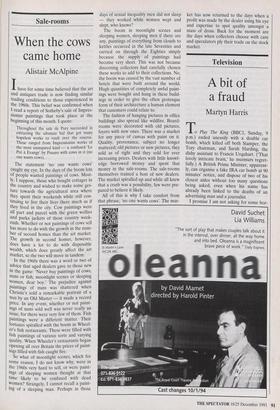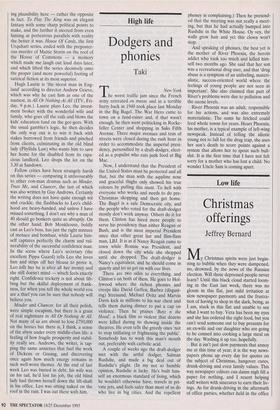Television
A bit of a fraud
Martyn Harris
To Play The King (BBC1, Sunday, 9 p.m.) ended uneasily with a double car bomb, which killed off both Stamper, the Tory chairman, and Sarah Harding, the dishy assistant to Francis Urquhart. (That lovely intricate brain,' he murmurs regret- fully.) A British Prime Minister, apparent- ly, can organise a fake IRA car bomb at 90 minutes' notice, and dispose of two of his closest aides without too many questions being asked, even when his name has already been linked to the deaths of an advertising man and a journalist.
I promise I am not asking for some bor-
ing plausibility here — rather the opposite in fact. To Play The King was an elegant fantasy with some sharp political points to make, and the further it steered from even hinting at portentous parallels with reality the better it was. House Of Cards, the first Urquhart series, ended with the preposter- ous murder of Mattie Storin on the roof of the House of Commons — a memory which made me laugh out loud days later, and which lifted the series decisively onto the proper (and more powerful) footing of satirical fiction at its most superior.
Hugh Laurie is 'the nicest man in Eng- land' according to director Andrew Grieve, which was why he cast him as one of the nastiest, in All Or Nothing At All (ITV, Fri- day, 9 p.m.). Laurie plays Leo, the invest- ment broker with the wonderful wife and family, who goes off the rails and blows the kids' education fund on the gee-gees. With the usual gambler's logic, he then decides the only way out is to win it back with stakes borrowed from friends and pinched from clients, culminating in the old blind lady (Phyllida Law) who wants him to save her home for the disabled from its rapa- cious landlord. Leo drops the lot on the 3.30 at Sandown.
Fellow critics have been strangely harsh on this series — comparing it unfavourably to other con-man dramas such as Minder. Trust Me, and Chancer, the last of which was also written by Guy Andrews. Certainly the writing does not have quite enough wit and crackle; the flashbacks to Leo's child- hood are heavy-handed, and unless I have missed something, I don't see why a man of 40 should go bonkers quite so abruptly. On the other hand, Bob Monkhouse, boldly cast as Leo's boss, has just the right mixture of menace and bombast, while Laurie him- self captures perfectly the charm and vul- nerability of the successful confidence man. In the scene where Leo's secretary (the excellent Pippa Guard) tells Leo she loves him and strips off her blouse to prove it, Leo tells her he is after all her money and she still doesn't mind — which feels exactly right. Confidence trickery is not about fib- bing but the skilful deployment of frank- ness, for when you tell the whole world you are a thief you can be sure that nobody will believe you.
Minder and Chancer, for all their polish, were simple escapism, but there is a grain of real nightmare in All Or Nothing At All. Not many of us are about to lose £750,000 on the horses but there is, I think, a sense of the abyss under every middle-class life: a feeling of how fragile prosperity and stabil- ity really are. Andrews, the writer, is tap- ping the same anxieties that fuel the work of Dickens or Gissing, and discovering once again how much energy remains in such well-worn themes. At the end of last week Leo was buried in debt, his wife was on his tail, he'd lost his job, the old blind lady had thrown herself down the lift-shaft in his office, Leo was sitting naked on the roof in the rain. I was out there with him.











































































































 Previous page
Previous page